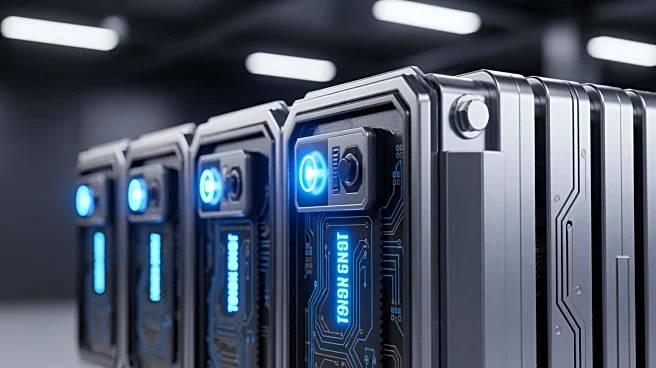What's Happening?
Peak Energy, a U.S.-based company specializing in energy storage technology, has entered into a multi-year agreement with Jupiter Power to supply up to 4.75 GWh of sodium-ion battery energy storage systems. The deployment is scheduled between 2027 and
2030, with an initial delivery of 720 MWh in 2027. This marks the largest-ever single deployment of sodium-ion batteries, with the contract potentially exceeding $500 million. Peak Energy's sodium-ion batteries offer advantages such as reduced degradation and lower maintenance costs compared to lithium-ion systems, making them a promising alternative for grid-scale storage.
Why It's Important?
The agreement between Peak Energy and Jupiter Power represents a significant advancement in the energy storage sector, particularly in the adoption of sodium-ion technology. This development could lead to more cost-effective and sustainable energy storage solutions, addressing the growing demand for reliable and dispatchable energy. The deployment of sodium-ion batteries may reduce dependency on lithium-ion systems, which have higher operational costs and environmental concerns. This shift could enhance the resilience of the U.S. energy grid and support the integration of renewable energy sources.
What's Next?
As Peak Energy begins the deployment of its sodium-ion battery systems, the company may attract further investment and partnerships, accelerating the commercialization of this technology. The success of this project could encourage other energy companies to explore sodium-ion solutions, potentially leading to broader adoption across the industry. Regulatory support and incentives for innovative energy storage technologies could also play a role in facilitating this transition, promoting a more sustainable and efficient energy infrastructure.
Beyond the Headlines
The introduction of sodium-ion batteries could have long-term implications for the energy sector, including the potential to reshape supply chains and reduce reliance on critical minerals like lithium. This technology may also drive innovation in battery design and manufacturing, leading to new business opportunities and job creation. Additionally, the environmental benefits of sodium-ion systems could contribute to broader efforts to combat climate change and reduce the carbon footprint of energy production.
















